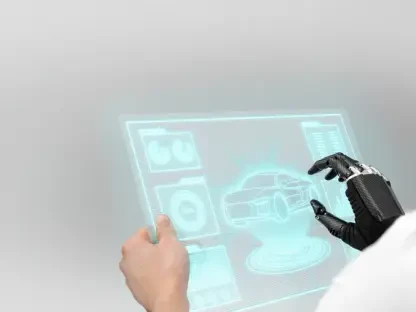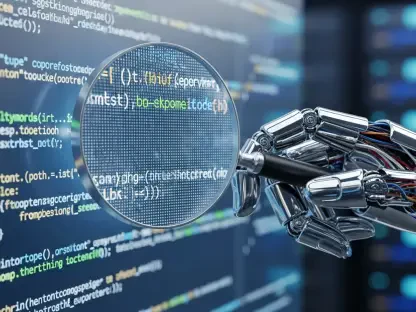In an era where software development is increasingly intertwined with artificial intelligence, Anthropic has captured attention with a staggering statistic: over $500 million in annualized revenue from its AI coding assistant, Claude Code. This figure not only highlights the growing reliance on AI-driven tools among developers but also sets the stage for a transformative shift in how coding is approached. With the recent expansion of Claude Code to web and mobile platforms like iOS, Anthropic is pushing boundaries to make AI-assisted coding accessible beyond traditional command-line interfaces, promising to reshape developer workflows across diverse environments.
Key Innovations in Platform Accessibility
The transition of Claude Code from a terminal-based tool to a web application marks a significant leap in broadening its reach. Available to subscribers of Anthropic’s Pro and Max plans through the claude.ai portal, the web interface eliminates the need for local setups, allowing developers to dive into coding tasks directly from a browser. This move aligns with the industry trend toward cloud-based solutions, catering to a wider audience who may lack the technical setup for command-line operations.
Beyond the web, the introduction of an iOS version—currently in a research preview—ushers in a new level of flexibility. Developers can now review code snippets, manage small tasks, or track ongoing sessions while on the move. Although still in its early stages, this mobile adaptation reflects Anthropic’s intent to ensure that AI coding assistance is not confined to stationary setups, meeting the demands of a dynamic workforce.
Standout Features of the Web Interface
A deep dive into the web platform reveals a suite of features designed to streamline development processes. Integration with GitHub stands out, enabling seamless connection to repositories for managing codebases directly within the browser. Claude Code’s ability to autonomously handle coding tasks based on user descriptions, coupled with real-time progress tracking in isolated environments, ensures efficiency and transparency during complex projects.
Another compelling aspect is the support for parallel task management across multiple repositories. This functionality allows developers to juggle diverse projects without losing focus, while automatic pull request creation and concise summaries of code changes simplify collaboration. These elements collectively reduce manual overhead, positioning the web interface as a powerful ally for modern software teams.
Mobile Potential with iOS Preview
Turning to the iOS offering, the mobile experience, though nascent, hints at significant potential for on-the-go productivity. Developers can engage with lightweight coding tasks or monitor active sessions from their devices, breaking free from the constraints of desktop environments. This accessibility caters to scenarios where immediate code reviews or minor adjustments are needed outside traditional workspaces.
Anthropic’s commitment to refining this mobile version based on user feedback underscores a user-centric approach. As improvements roll out over the coming years, from 2025 onward, the iOS platform could evolve into a robust tool for developers seeking flexibility without sacrificing functionality. The focus on iterative enhancements signals a promising trajectory for mobile AI coding assistance.
Industry Trends and AI Integration
The expansion of Claude Code mirrors a broader shift in the tech landscape toward AI-integrated, cloud-based developer workflows. Anthropic’s leadership, including CEO Dario Amodei, has boldly predicted that AI could eventually write up to 90% of code for software engineers, a vision that challenges conventional coding roles. This perspective highlights the transformative power of tools like Claude Code in automating substantial portions of development.
However, Product Manager Cat Wu emphasizes a balanced strategy, ensuring that the command-line interface remains the pinnacle of customization and intelligence while expanding to web and mobile platforms. Despite this optimism, the tech industry exhibits a mixed reception, with some expressing caution over heavy reliance on AI for critical coding tasks, pointing to a debate over the future balance between human and machine contributions.
Practical Applications Enhancing Productivity
Examining real-world applications, the web interface excels in addressing project architecture queries and managing bug fixes with precision. It automates routine tasks and supports backend changes through test-driven development, ensuring modifications are validated effectively. Such capabilities allow developers to shift their focus from repetitive coding to strategic oversight of AI-generated outputs.
The potential of the iOS version further extends these benefits by enabling quick interventions during travel or remote situations. Whether it’s a last-minute code review or a minor tweak, the mobile platform promises to keep developers connected to their projects, enhancing overall productivity by bridging gaps in accessibility across different contexts.
Security Measures and Challenges
Navigating the cloud-based model of Claude Code brings forth critical security considerations. Anthropic addresses these through sandboxed environments for each task, enforcing strict network and filesystem restrictions to safeguard sensitive data. Secure Git proxies protect code and credentials during interactions, while customizable network settings allow control over access to external domains for specific operations like package downloads.
Despite these measures, challenges persist in gaining widespread industry acceptance of AI-driven coding, particularly in environments where data security is paramount. Ongoing refinements to the iOS preview and user feedback integration are vital steps Anthropic is taking to build trust and address lingering concerns, ensuring that functionality does not compromise safety.
Long-Term Implications for Software Development
Looking ahead, the trajectory of Claude Code suggests a future where AI coding tools could redefine the developer’s role. Potential enhancements to both web and mobile platforms, driven by community input, may introduce even more sophisticated features over the next few years. This evolution could further automate complex coding tasks, pushing the boundaries of what AI can achieve in software creation.
The broader impact on the industry might involve a fundamental shift in skill requirements, with developers focusing more on strategic design and less on manual coding. Anthropic’s innovations could set a precedent, encouraging other players to accelerate AI adoption in development tools, potentially leading to a landscape where human oversight and AI execution coexist seamlessly.
Final Reflections on a Pioneering Expansion
Reflecting on this technological stride, Anthropic’s rollout of Claude Code to web and iOS platforms stands as a bold step in democratizing AI-assisted coding. The impressive revenue growth and user base expansion underscore the tool’s resonance with developers, while robust security protocols and productivity features solidify its standing. As a next step, stakeholders could prioritize deeper integration of user feedback to refine mobile capabilities, ensuring that accessibility continues to evolve. Additionally, fostering industry dialogue on balancing AI reliance with human expertise emerges as a crucial consideration, paving the way for sustainable innovation in software development.









